|
I've been a terrible blogger lately. I've totally neglected you.
I promise it's for a good reason, though! The last time I blogged, I had just found out that the pipeline 3.5 miles away from my cottage is supposed to eventually start carrying diluted bitumen (a mix of heavy crude and 30% toxic chemicals) from the Tar Sands. I was devastated. But I have some good news! Tomorrow, Climate Justice Montreal is putting on a community forum against tar sands and pipelines. I'm one of the volunteer coordinators and I'm presenting a 101 workshop, so I've been pretty busy. It's free! We'll be on the 7th floor of the Hall building in Montreal. Childcare, whisper translators, and free lunch will be provided. You should go - it's gonna be awesome.
0 Comments
 At the boonies when I was a kid I love my tiny homestead. My parents have had the cottage since before I was born, and have spent days, weekends, weeks there. We call it the Boonies because it is pretty much in the boonies. I still have the scar on my forehead there when I was a kid and hit my head on the cement when they were building the house. When I was five, I was playing by myself outside and a coyote walked right past me. I used to hate going there when I was 13 because my friends started going to the movies with boys and I wasn't allowed to go because I had to go up to the Boonies instead with my parents. But now, I adore it. When I was in Australia for six months, it was the thing I missed the most in the whole wide world. When I'm stressed out during the week figuring out how to make sustainability work in real life, I can't wait to finally jump in the car with the love of my life and my cat (yes, we seriously take our cat there every time we go) and get to the country. In the summer, when our downtown apartment feels stale, and all I can smell in the city is leftover food, garbage, and car fumes, breathing fresh air at the Boonies is...heaven. This past summer, I remember hoeing my potato patch, getting blisters in the sun by myself, listening to my bees hum, and thinking - man, this is the only place I want to be right now. This is exactly what I want to be doing. And then I realized on Monday morning that there is a pipeline that goes from Montreal through the Eastern Townships and passes about 3.5 miles from my cottage. It's been there for decades and so far seems fine. I heard something last week about Enbridge's Pipeline Nine Project, which reverses the flow of oil between Sarnia, Ontario, and Montreal. After some research, I realized this pipeline would take Tar Sands oil (less refined and thicker - higher possibility of a leak) to Montreal, and the Trailbreaker pipeline would then take it to Portland, Maine to export it. I was shocked. The pipeline crosses the river a few miles up the road from us. This river: We're downstream from the pipeline. Which means that over the next few years, there is an increased chance that there could be an OIL SPILL on the river that I love. The river that I go kayaking in. The river that we have bonfires next to to watch the moon rise over the trees. The river that one time when I was a kid, I saw a bullfrog swimming by me and I caught it out of the water with my bare hands. That one.
So I guess I found a new project for myself - working with the other PowerShift kids, pissed off landowners in Quebec, and community organizers to stop this thing. I found this meme on the Sustainable Man facebook page a few weeks ago, and it's been stuck in the back of my brain since. I often wonder about how to get things changed for the better - how do we get people to switch to clean energy? Eat more healthy and more local or organic food? How do we get the people around us to think more about their impact?
When I was in high school, I felt that the best way to change people was to confront them. Not necessarily in a mean way, but to tell them they were making the wrong decision. I used to be part of the recycling club, and we used to sort and wash all of the cans from the cafeteria once a week. It was actually a really gross and tiring job, since some of those cans had been sitting around for several days (the worst was bottles of chocolate milk). But still, there was a good handful of very dedicated students that, no matter how disgusting it got, were determined to recycle these cans. There were often garbage cans without recycling bins next to it in the cafeteria, and people would just toss everything in the closest garbage. So every morning, I would drag a recycling bin past rows of tables so it would be next to the garbage. Then when people didn't recycle their cans, even when it was right next to them, I would yell "RECYCLE!!!" at them. I don't remember how effective this was, but today I can guess that this probably wasn't very effective because generally people don't like being yelled at, much less by a squeaky blonde girl. Fast forward ten years. Funny enough, one thing I work on at Sustainable Concordia is to institutionalize the idea that garbage bins can't be by themselves - they need to have recycling and compost bins next to them. But I don't yell at people when they don't recycle. And I don't tell people to turn off their car when it's idling, and I don't freak out when people eat factory farmed meat. In my personal life at least, I try not to fight the old system. Oh, it's not because the old system doesn't need to be fought - at an institutional or governmental level. In my own way, I try to create a new system, and support others who are working on the new system. I think the local food movement is a perfect example of this. Simply telling people that it's bad to eat genetically modified corn-based foods grown far away isn't going to do change much. Give them a super fresh, delicious organic tomato grown on a rooftop or right outside the city, along with an easy recipe so they know what to do with it - now we have the beginning of a change. 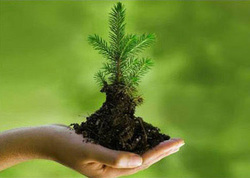 Anyone else sick of these super generic photos? You know what to do - turn off the lights when you leave the room, recycle, turn off the water when you're brushing your teeth. That's what I grew up with hearing, and you probably did too. Now there are tons of tips to "go green", from everything to forgoing the receipt at the ATM, to search on Blackle instead of Google. I definitely encourage everyone to do as much as they can, and if they feel motivated to make these small changes, go for it. We need all the help we can get, and if that means switching to one energy-saving lightbulb, awesome. But let's face it - only switching to organic milk and bringing a reusable mug is not going to solve our environmental problems. Climate change, mass losses of biodiversity (I learned today at the Botanical Gardens that 130 species go extinct a day), complete dependence on fossil fuels, our obsession with stuff - we have some huge issues to deal with. We gotta step it up. It's hard not to feel defeated sometimes. I often see that people want to do good, but they think that they're just one person - what can they do? Or, sometimes people are super proud that they recycle, but then take long flights to Europe every year or drive an insanely inefficient car. I read a study the other day that found that the more guilty people felt about their environmental impact, the more likely they were going to do something about it. Not that I'm advocating that we make everyone feel guilty about their actions (which would probably lead to denial and apathy), but the study also felt that people in the US who felt that their individual actions made a difference for the environment were also the most likely to have a huge eco-footprint. I think that people don't know how much their actions really make a difference (positive or negative), and So to help clear things up, I've made a list. First, calculate your carbon footprint with myfootprint.org to put it all into perspective. I calculated that I've reduced my environmental impact by SIX times by following these steps. 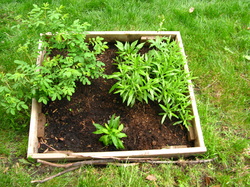 If you only do 5 things for the environment, here's what you should do: 1. Eat local (preferably from your backyard) Most of our produce is shipped from really far away, on gigantic farms that only grow one crop, and sprayed with tons of pesticides. This way of farming is totally dependant on huge chemical companies (like Monsanto, my fave), fossil fuels, and exploiting cheap migrant labour. Even if you know nothing about gardening, you can join a community garden, get an old person to help you (I learned almost everything I know from my Papa), or start with some tomato plants or a little herb garden. Fresh food tastes so good, and it's super satisfying to eat something that you grew from a seedling. Growing your own food is cheaper than buying it in the store, it's healthier since there won't be any pesticides, and it doesn't get any more local than your backyard. If you have extras of certain food (and you will), you can freeze it, can it, pickle it, make spaghetti sauce, or bring some zucchini over to your friends. 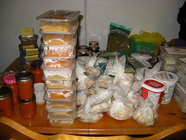 Hold a food swap with your extra stuff! If you don't have a backyard, start one in your apartment. Grow herbs on your windowsill, sprouts in your kitchen, or mushrooms, if you're daring. And if you are way too busy or kill everything you touch, join a community supported agriculture (CSA) in your area. You'll pay for a season's worth of vegetables up front or in instalments, and then you get a basket of super fresh food every week. When you're in the grocery store, try to pick the most local food, which can be as simple as picking the apple from Quebec instead of the one from New Zealand. Then compost your food waste. Food doesn't really decompose in landfills since there's no oxygen, and instead it releases methane, which is a powerful greenhouse gas. 2. Ditch your car. You don't have to get rid of it completely. Cars are extremely useful for going places or carrying heavy things. But you don't need your car to take you two blocks away. And you don't need your car if your neighbour is also going to the same place at the same time. And you don't need to make ten trips for errands if you can get it all done in one shot. Cars are a total hassle to park (especially in the city), and something in your car will inevitably break, which will be expensive. By avoiding your car, you'll save money on gas and prevent adding greenhouse gas emissions. 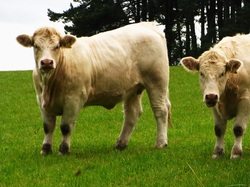 Huh? Meatless Monday? 3. Go meatless sometimes (or all the time). Thanksgiving turkey, Christmas ham, Sunday roast, hot dogs over a fire, summer barbecues - eating meat is definitely in our culture. There are some health benefits to eating meat and animal products, and there are few people who can resist the smell of bacon in the morning. Eating meat at every meal though - or even every day - is unnecessary, actually kind of expensive, and contributes big time to your ecological footprint. To grow all of these animals, farmers need corn - lots of corn which is grown with pesticides. Cows are actually supposed to be eating grass, not corn, so it makes them fart, and this methane contributes to climate change (not making this up). In 2006, it was estimated that meat production contributes to 14-22% of greenhouse gas emissions. A nonvegetarian diet needs 2.9 times more water, 13 times more fertilizer, and 1.4 times more pesticides than a vegetarian diet (Marlow et al. 2009). Most people can't quit meat cold turkey, so first try to go Meatless Monday. If you grew up with a standard meat and potatoes family dinner like I did, you might have no idea what kind of food to make. So many vegetarians are asked "so you only eat salad?!?" when really, with a little of bit of creativity and grocery shopping, their plates look way more appetizing than the usual pork chops and steamed broccoli. If you need a little inspiration for vegetarian recipes, check out Yummly, Vegetarian Times, or Veg Web. For some amazing vegan recipes, I love One Lil' Vegan's blog. 4. Buy second-hand. It takes 713 gallons of water to make one tshirt. We often don't think that stuff we buy - new cell phones, pants, laptop, sofas, whatever, comes from resources that have to be mined or cut down, and processed, and transported until we get them. Buying new stuff is a drain on water and energy, and then we have to think about what to do with all of this stuff when we're done with it. Most of this stuff can be recycled, but often we don't recycle it. We could just throw it out, but where does all that stuff go? I think most people have the idea that our plastic stuff will break down eventually, but it supposedly takes thousands of years in a landfill for stuff to decompose. Let's face it- that's pretty much never. Your stuff will be there forever, even after you're gone. Use freecycle.org, scout out the free sections of Craigslist, or borrow stuff from your friends. If you have friends the same size as you, organize a clothes swap (my fave way to get free, pretty clothes) or shamelessly snatch furniture, old appliances, and random good stuff from the garbage. 5. Put on (or take off) your sweater Air conditioning and heating are the biggest energy-users in your house. Turn down the heat and wear a sweater and socks in the winter, and open the windows and prance around in your undies in the summer. (Kidding. You probably won't do that. But you know what I mean.) If you have a thermostat, program it so that your heating or cooling only kicks in during the hours that you're home - why waste money heating an empty house? And if you do turn on the heat or air conditioning, make sure it can't escape (like through drafty doors or open windows). And my last tip - when you're washing your sweaters and socks, wash them in cold and dry them on a line. Heating water and clothes up is also a big energy guzzler. Simple, right? Okay, maybe not. I know that doing "the right thing for the environment" can often seem confusing, but I really think that our society needs some perspective. I know most people aren't as nerdy as I am and want to know the carbon footprint of a banana or a computer, but I think if everyone followed these five ideas, we would all have a smaller environmental impact. It's not too late to make changes - but we need to make the right changes. I did a challenge a few months ago to see if I could go vegetarian for a month. It wasn't really that hard, since I've never been a big meat eater. I do have some major weaknesses, like chicken shwarma, hotdogs (I know.), and ham sandwiches. I thought after going vegetarian for a month, it would make me totally repulsed to all meat, but I was surprised at how easily I went back to my old habits.  I was at the bookstore two months ago, and I was flipping through Jonathan Safran Foer's Eating Animals. I stumbled across a sentence that said pointed out how easy it is to agree with vegetarianism, but how also easy it is to justify eating meat when you really want to. I felt that it caught my hypocrisy so well, and it made me feel uncomfortable. How could I be vehemently against "conventional" meat from factory farms, owned by huge companies with very little regard of animal or human welfare, but then cave every time a mini quiche lorraine is passed in front of me? It's not that I'm against eating animals in principle - My background is in ecology; I get the food chain. But I also get the ethical and environmental issues. I'm not going to tell you why I'm a vegetarian now; I think deep inside, almost everyone knows why it's "bad" to eat meat. I think we all know of the suffering, but we all choose to be in total denial about it. Why? I think it's because it tastes so good. Come on, people - bacon? Smoked salmon? A nice big slab of filet mignon? I would gobble all of this up any day; it tastes amazing. We love meat, and it's a part of our culture. We don't like it when people tell us that enjoying this is wrong.  I don't want to be one of those pretenious "meat is murder!" screaming vegetarians, but I don't think I can be in denial anymore. I have a friend who considers herself a "happyterian" - as in, she will only eat animals that were happy during their lives until they were killed. I like this idea, and it's inspired me to be an ethiterian. I only want to eat ethically raised meat and seafood. But how do I know that what I'm eating is ethically raised? For seafood (I love smoked salmon), it's getting easier to know. I look for Marine Stewardship Council certified products, which is guaranteed by a third party to be from a sustainable fishery. You can also use the Seafood Watch app put out by the Monterey Bay Aquarium, which will suggest what species are more sustainable. It's pretty cool and useful if you eat a lot of fish - it also has a list of sushi recommendations or what to avoid. What about chicken, pork, and beef? How do I know if it was ethically raised or not? Well, I feel pretty certain that anything that comes from a supermarket was from a factory farm, unless it specifically says otherwise. I've decided to stick to farms or small stores that I trust, which is now is mostly friends' farms. It hasn't been too accessible so far - which is why I haven't eaten meat in two months. Hopefully this will improve as more people get into small, sustainable farms and grocery stores offer more of these products. I'm also okay with hunting, and one day I would like to hunt my own meat. I'm not sure if I could actually do it... I imagine the scene going: BANG! and then I burst into tears and cry all day. I think it's important for me to do this one day, but until then I'm relying on the hunting skills of my family members (like my cousin's excellent Christmas present to me). I think ideally, if you eat meat, you should be okay with the whole process, not just the steaming steak on your plate. Maybe one day we'll be able to assume that all of the meat at the grocery store is sustainable, unless it says otherwise. I've started a twitter account lately, and I find it super addictive. I had a big problem coming up with the name of my twitter handle, though. @ShonaWatt was already taken, and I didn't want to do the old cheesy AOL style ShonaWatt87 or something like that. So I tried to think of what defines me these days, or what I really care about. And I really care about....my homestead. When you think of a homestead, you probably think of Little House on the Prairie with men in overalls and women churning butter. I'm really into doing and making things (especially food) myself, and in the past year I've made my own cider, wine, jam, pickles, yogurt, salsa, grown my own potatoes, harvested my own honey, and foraged for wild plants. I am a wee bit back to the land. Okay, well think Laura Ingalls with a desk job in the city + a blog + facebook, and that's me. 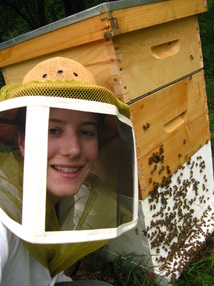 me. But like so many of my friends who dream of having farms, there's no way I can afford my little plot of land right now. Nor would I want to completely disconnect from the internet and city life, as I am still relatively young and don't want to be totally isolated in the woods just yet. So I do what I can - I grow sprouts and very sad looking plants on my apartment windowsill, I buy seasonal fruit in bulk and then make jam, freeze, or dry them, and I got my friends together to squish 50 pounds of apples to make cider in my kitchen (never again). Luckily, my parents bought a little country house when they were my age, and my family has been super fortunate to be able to have this piece of heaven. And last year for my birthday, they gave me a piece of it. Not for real - I don't have any paperwork or anything, but I got some. I got a field. You are probably not at all impressed. A field with a rusty swingset! Let me walk you through it. 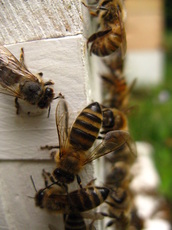 First, on the left-hand side, we have the two beehives. If you don't know this already, bees are super fascinating, and there is NOTHING better than fresh honey that you snatched from the hive. Getting stung sucks. I love the bees, they hate me. Next to the beehives, there's an apple tree that makes really sour, small apples. They have been feeding deer for years, and since my first act as a landowner was not to mow my side of the field, the deer also now sleep there. At first I thought it was super cool, until I realized that they were also eating all of my garden. 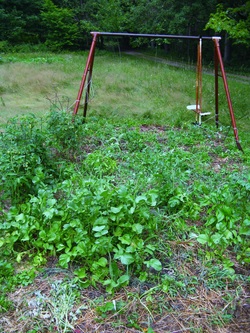 one part of the garden My garden is a constant source of pride and frustration. I only check on it every two weeks, and there no fence around it, so I basically spend two hours weeding it per month, and I occasionally I manage to beat everything else to a pea or a zucchini. The semi-cool thing is that I make this garden every year by laying down cardboard and vegetable scraps in the fall, and by spring it really improves the soil. This year the radishes, kale, and basil have been doing well, so it's not a total loss. Next year I'm building a fence. The swingset? We've had this swingset rotting around for a while now, and at first I was going to turn it into a little greenhouse with a plastic tarp. But then I realized that wouldn't work because I would never be able to water them that way, so I turned it into a giant trellis for peas. Towards the back of the field, I have a big potato patch. Not much weeding necessary, potatoes don't need too much attention, and I also have some zucchini, squash, and cucumbers. It's no 5 acre-farm, and I know it doesn't look like much. But I build onto it every year, and eventually I would love a greenhouse, chickens, more bees, and a bigger garden with an actual fence. One day I'd like to live out here - if someday we ever get internet in the country. Until then - this is my tiny homestead. 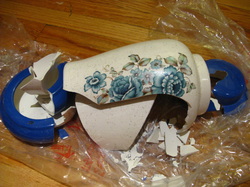 Last night, we broke a lamp. It was a fairly hideous, second hand ceramic lamp (sorry, whoever we got it from!). It fell off the table and got chipped, and then a few hours later, it got knocked off the table again and smashed. I took that as a sign that finally, this lamp's time in our collection of second and third hand furniture, was over. Yesss! There are two pretty embarrassing qualities about me (actually there are a lot more, but hey, let's start with two), and they are: 1) I am extremely cheap, as in, I would much rather get something for free or cheap from someone else than buy a totally new one, and 2) I am really, really, really bad at math and putting things together. For the daughter of a family of engineers, I clearly missed a gene somewhere. Anyway. These two qualities are good background info because they set you up for tonight's project: I made a new lamp! Out of the old one that I broke! Since the actual lighting and cord part of the lamp still worked, I wanted to make another lamp out of it. I've seen lamps and chandeliers made out of mason jars lately, and I think they look really cool, in a hipster and kind of cheap-o way. But there was a long metal rod that housed the light cord up through the ceramic parts of the lamp, and that thing wasn't coming off, nor did I know of a gigantic mason jar that would hold it. Luckily for me (and unluckily for my partner), I have kept a cool-looking bottle since November, in case I needed to use it one day. And with a little bit of fiddling, I made: 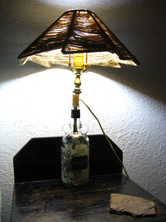 Just to prove that it actually works The bottle is pretty sturdy, which is why I chose it instead of a wine bottle. The metal rod was really long, so to cover up the empty space at the top, I cut a plastic cork in half and stuck it in. I just happened to have a cork...it's one of the other projects that I'm planning, which hopefully you will one day see if it's not too embarrassing. I swear, I'm not a hoarder. Not bad for someone who can't figure out how to build IKEA furniture or put up new curtains, eh? Holey moley of heatwaves here. Today in Montreal it was around 30C, and it felt like 40C with humidity. It has made my apartment almost unbearable, and the thought of turning on the stove to make something for supper sounds about as appealing as taking a hot bath in summer. I managed to make a quick supper with mostly raw ingredients, and collapsed on my futon with a big glass of iced tea to watch the news.
Today the news, besides the multiple corruption scandals and a serial killer, had a theme. First up: this crazy heatwave (technically not a heatwave since this is only day 2; a heatwave is 3). Record breaking temperatures. Next: there is a gigantic sinkhole downtown because of unusual flooding from a few weeks ago. The road just gave way, and they don't know how deep the hole is. Last: a warning to check yourself for ticks, since there has been an invasion of the parasites and lyme disease coming up from the states. At first, these just seem like random, crappy luck. Bad weather. Bad ecology. But I'm 1/3 into reading Bill McKibbin's book Eaarth, which at this point is a narrative of all of the terrible, expensive, crappy luck that has happened because of climate change. Islands disappearing from rising sea levels. Droughts in Africa. Polar bears. We know these big, iconic results of climate change, but it's getting worse. We used to just be able to say "oh yeah, the polar bears might one day die from climate change". Ice caps, or something. It used to be somewhere else, someone else, someone else's problem. But flooding (lookin' at you, Burlington), super warm winters (lookin' at you, skiiers), weird temperatures (remember wearing a tshirt on St Patrick's day?), abnormal temperatures that affect agriculture production (lookin' at my dad, who had a terrible maple syrup season), and now this heat wave is making it hit home. Literally. My apartment is sweltering, and we're not even July yet. The news tonight had at least three stories about the effects of climate change. Was "global warming" or "climate change" even mentioned? Even "changing" and "climate" kinda maybe in the same sentence? Nope. They didn't even explain why the Ontario government now has to spend money for public service announcements to tell people about increased lyme disease: The ticks are getting more up north because it's linked to warmer temperatures, since normally they can't survive our winters. I come from a science background, so I tend to be very cautious when saying something is definitely caused by something else. I'm a skeptic, of everything. I don't want to say that something is for sure until I've seen pretty good proof of it. I understand why a mainstream reporter wouldn't say that this is because of climate change. The blog comments and editorials would come out: we don't even know if climate change is real, the scientists are wrong, there isn't much proof of all this stuff anyway. I did my Master's research on behaviour change related to saving energy. I know the psychology behind all of this. Climate change is scary. It's too crazy to be real. But it's happening. Right now. 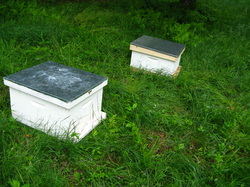 My two new hives! About two weeks ago, I got two new bee colonies! Last year, I had a beehive at the Macdonald Campus with their McGill Apicultural Association. But in winter, I realized that they had died from colony collapse disorder. When I opened the hive, there were only about five dead bees, and lots of honey and brood left. They seemed to have just...disappeared. It was extremely weird and characteristic of colony collapse disorder, so I started reading a lot of scientific papers. I'm still working on a literature review, but personally, I think the science is pretty clear: corn coated in pesticides are poisoning bees at sublethal levels, weakening their immune system. This article in the New York Times sums up two scientific studies that were released at the end of March: http://www.nytimes.com/2012/03/30/science/neocotinoid-pesticides-play-a-role-in-bees-decline-2-studies-find.html When I stared into my dead hive in late January, I felt angry. I felt determined. I was going to help change this. I was pretty torn in the spring. I wanted to move my hive to somewhere without pesticides, but I thought that I wouldn't have as much say in the bee club, since I would no longer have a hive there. I wouldn't really be a stakeholder anymore. So I've continued to work on the literature review, and it is somehow taking me forever to complete. But I'm getting there. And I moved my bees to the cottage. The cottage! My parents have given me half the field (I am now a landowner! Well...unofficially.), so that's where my garden, an old apple tree, a meadow, and now my bees live. I love my garden, but the poor thing is so neglected since I can only go once every two weeks. Bees, luckily, only need to be visited once every two weeks. So far the two hives are doing well. It's interesting to have two this year instead of one, so that I can compare which one is doing better. I'm not sure if they like me yet, but I love them.
I'm definitely failing this challenge. After doing research about the link of colony collapse disorder to systemic pesticides used on the majority of corn, I have been trying to avoid everything with high fructose corn syrup. At first I thought it wouldn't be too hard, because I don't eat many processed foods. However, anytime I want a snack or a condiment, I have to check the labels. Lately, I've just been avoiding anything with sugar in the ingredients, since I'm not sure where this "sugar" comes from. Beets? Sugar cane? Corn? Who knows. So I'm trying to avoid it all. I haven't been totally sugar-free, and have consented to the occasional ice cream or ketchup. I have definitely reduced my normal consumption, though, and I don't get those gross feelings after you eat too much sugar. However, I'm feeling like a person on a diet who has intense cravings where I want to eat all the ice cream in the world! I've been trying to make a lot more snacks myself, to avoid getting antsy during the day and caving. I have two ideas for you, if you'd like to try something new: Banana ice cream and candied pumpkin seeds. 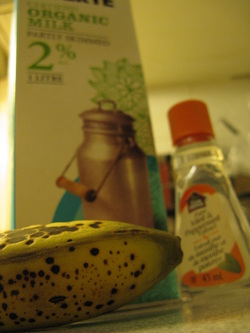 I had heard about making ice cream from just frozen bananas before, but I thought that there's no way it could taste that great, since I'm not crazy about just eating a banana. Wrong. I chopped up two frozen bananas and threw it in with half a peach, a half cup of milk and a drop of peppermint extract. I blended it together, and stuck it in the freezer for a bit. And... AMAZING. It really does taste like ice cream, and the best part was after my second bowl, I knew that I had only eaten a banana and a quarter cup of milk. The maple pumpkin seeds are almost just as easy. I found this recipe here:
http://www.food.com/recipe/roasted-pumpkin-seeds-with-maple-syrup-145280 Since my dad makes maple syrup, I have plenty of it at home. I mixed a cup and a bit of pumpkin and sunflower seeds with 1 tablespoon of maple syrup, 1/2 teaspoon of salt, and 1/4 teaspoon paprika. I put the mix on a baking sheet, and roasted it at 425F. I watched them really carefully and stirred halfway through, but it probably was only in there for about five minutes before they were ready. And then I ate them. Lots of them. The sweetness of the maple syrup, the saltiness, the spices...MMMM. If you got any more corn-syrup free snack recipes, keep 'em coming! |
About ShonaI'm an eco-conscious girl from Montreal, Quebec. I'm currently an adjunct science professor at Champlain College of Vermont (Montreal Campus). I'm interested in any opportunities to expand my experience with grassroots activism, climate change legislation, or environmental education. Archives
March 2016
Categories
All
|

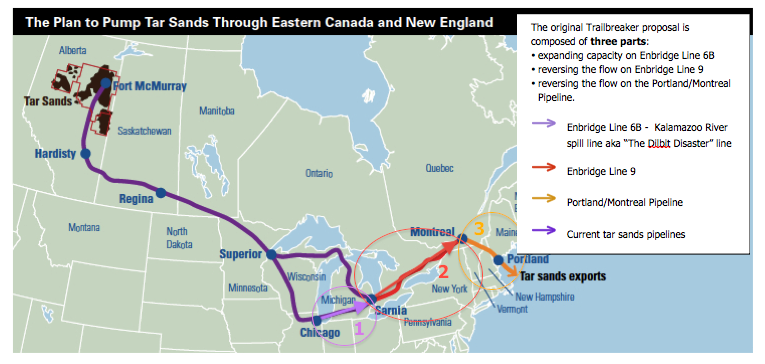
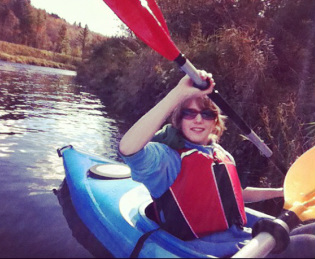
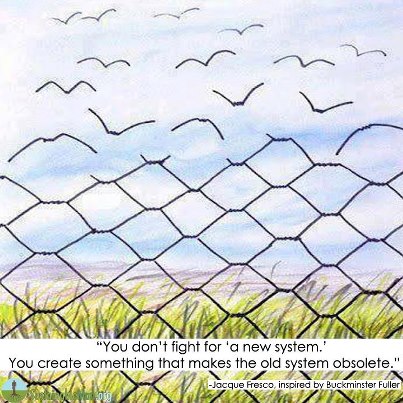
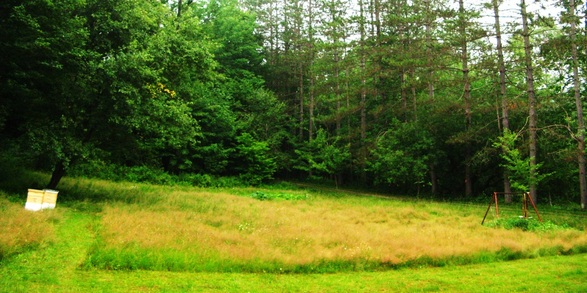
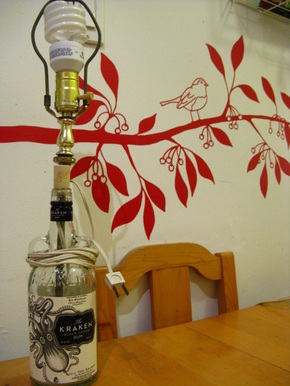
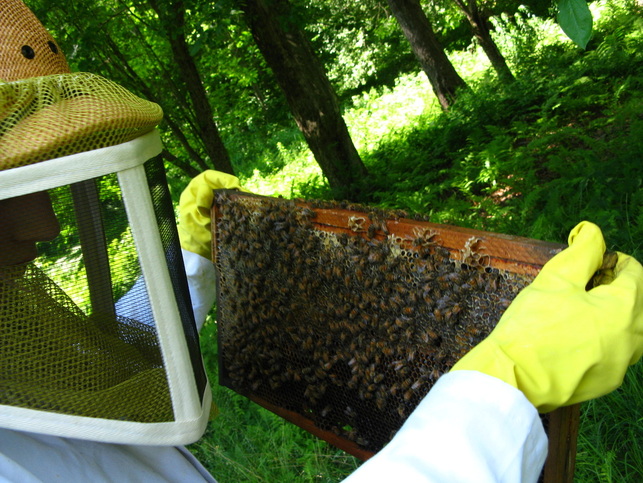
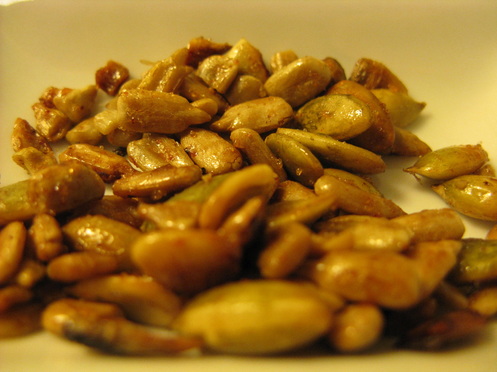

 RSS Feed
RSS Feed
